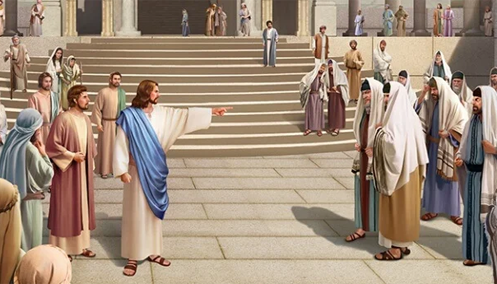


Common Objections
Common Objections
Catholic Outlook
Catholic Outlook

Catholic Outlook
Common Objections
Common Objections
__________ Recent Additions __________
Catholic Outlook
Catholic Outlook
__________ The Bible __________
“Jesus condemned tradition (Mark 7:5-13), but Catholics elevate their man-made traditions to the level of equality with Scripture!”
Gary Hoge

It is sometimes argued that Scripture must be our only source of truth because Jesus condemned tradition:
Jesus made it clear that the Bible was in a class of its own, exalted above all tradition. He rebuked the Pharisees for not accepting sola Scriptura and negating the final authority of the Word of God by their religious traditions, saying “And why do you break the commandment of God for the sake of your tradition? . . . You have nullified the word of God for the sake of your tradition” (Matt. 15:3, 6).1
But Jesus did not condemn all traditions indiscriminately, just those “traditions of men” that nullified God’s word. For example, the Pharisees created the “Corban” tradition by which they would make a donation to the temple to avoid having to support their parents in their old age.2 Thus, by their tradition they nullified the Word of God, which said, “Honor your father and mother.” However, there were other rabbinic traditions that Jesus upheld. For example, in Matthew 23:2-3, we read, “The teachers of the law and the Pharisees sit in Moses’ seat. So you must obey them and do everything they tell you. But do not do what they do, for they do not practice what they preach.”
The Old Testament never mentions Moses’ seat, but it was common knowledge in Israel that the authoritative teaching office of Moses was passed on to his successors. Thus, the Pharisees held a legitimate teaching office, and they must be obeyed, but not imitated:
As the first verse of the Mishna tractate Abote indicates, the Jews understood that God’s revelation, received by Moses, had been handed down from him in uninterrupted succession, through Joshua, the elders, the prophets and those of the great Sanhedrin (cf. Acts 15:21). The Scribes and Pharisees participated in this authoritative tradition and as such their teaching deserved to be respected.3
Jesus upheld the legitimacy of the Pharisees’ teaching office based on Tradition, not Scripture. And the deposit of faith he entrusted to the apostles was entirely Tradition for years before the first word of it was written down. Even then, writing under the inspiration of the Holy Spirit, the apostle Paul upheld the validity of that Tradition, whether it was written down or not:
Now I praise you because you remember me in everything, and hold firmly to the traditions, just as I delivered them to you (1 Corinthians 11:2).
So then, brethren, stand firm and hold to the traditions which you were taught, whether by word of mouth or by letter from us (2 Thessalonians 2:15).
And we also thank God continually because, when you received the word of God, which you heard from us, you accepted it not as the word of men, but as it actually is, the word of God, which is at work in you who believe (1 Thessalonians 2:13).
And the things you have heard me say in the presence of many witnesses entrust to reliable men who will also be qualified to teach others (2 Timothy 2:2).
The apostolic Tradition to which Paul refers comes from God and is to be accepted as such. But there’s nothing intrinsically wrong with man-made traditions, provided they don’t contradict the word of God. For example, the “sinner’s prayer,” the altar call, Sunday worship, tithing money, confessing our sins directly to Jesus, weddings performed by clergy, pews, pulpits, praying with hands folded, Wednesday night Bible study, “praise and worship music” in church, sermons, the doxology at the end of the Lord’s Prayer, infant dedications, daily devotions, and the celebration of Christmas and Easter are all “traditions of men,” but there’s nothing wrong with any of them, and many Christians practice one or more of them.
So, it’s true that Jesus rejected some of the Pharisees’ traditions, but others he upheld. And the ones he rejected he rejected because they contradicted the word of God, not because they were man-made. Most importantly, the Tradition he entrusted to the apostles, that was spread by them to the communities they established, was to be accepted “not as the word of men, but as it actually is, the word of God” (2 Thessalonians 2:13).
__________
1 Norman Geisler and Ralph E. MacKenzie, “What Think Ye of Rome,” Christian Research Journal, Spring/Summer 1994, 35.
2 “What does Corban mean in Mark 7:11?,” Gotquestions.org, https://www.gotquestions.org/corban.html
3 L. Sabourin, The Gospel According to St. Matthew (Bombay: St. Paul Publications, 1982), vol. 2, 793.
Copyright © 2024 Catholicoutlook.me
MENU